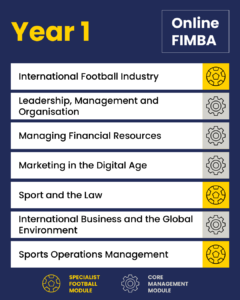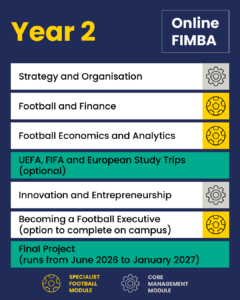How you'll learn
The course curriculum


Teaching and assessment
The learning, teaching and assessment strategies for all online programmes are aligned with the three University of Liverpool hallmarks of research-connected teaching, active learning and authentic assessment – as well as the three University of Liverpool Graduate attributes of confidence, digital fluency and global citizenship.
You’ll take modules totalling 120 credits, with the dissertation or consultancy based project completed at the end of your studies being worth 60 credits. You’ll be supported by your academic supervisor during the dissertation or consultancy based project.
You’re required to complete 180 credits to achieve a full MBA. Subject to meeting specific criteria outlined by the University, you’ll graduate with a Pass, Merit or Distinction.
How you’ll study
Studying online allows you to study in your own time and from wherever works best for you – whether that is from your home, during your lunch hour or anywhere else you have internet access.
With online FIMBA, you can study in your time and wherever through live and recorded sessions. All our online programmes are delivered through Canvas, the University’s Virtual Learning Environment, enabling you to thrive in a flexible and engaging hybrid approach.
Key features include:
- User-friendly interface accessible on smartphones, tablets, and computers
- Comprehensive course content with multimedia materials
- Interactive tools for collaboration and discussion
- Real-time feedback and progress tracking
- Mobile app for on-the-go learning
- Integrated communication tools
- Easy assignment submission
- Extensive digital resource library
Canvas provides a flexible, engaging learning environment that combines the benefits of online study with the interactivity of traditional classrooms.
Assessments
Online programmes are assessed based on work carried out in the virtual classroom. Reflecting the hallmark of authentic assessment, this may include report writing, reflective practice, research projects, and individual or group presentations that represent the kinds of tasks you would be expected to undertake in a professional setting. There is also one exam (delivered online) within the Managing Financial Resources module.
The weighting of individual components will vary from one module to another. All assessment information is included within the module handbook at the start of each module.
Online learning experience
We will support your online learning experience with high-quality learning materials and resources, which can all be found on Canvas.
Typically, your learning experience will include the following:
- directed learning – including participation in virtual discussions with peers, led by the lecturer, working through relevant and specially prepared videos and lecturecasts; completing interactive exercises on the learning platform; and appointments with your lecturer during office hours
- self-directed learning – including wider reading and research in your subject area to further develop your knowledge and understanding
- assessment – time taken to prepare and complete assignments and activities which contribute to your overall assessment.
On average, you will need to dedicate a minimum of 15-20 hours of study per module, per week.
Liverpool Hallmarks
We have a distinctive approach to education, the Liverpool Curriculum Framework, which focuses on research-connected teaching, active learning, and authentic assessment to ensure our students graduate as digitally fluent and confident global citizens.
The Liverpool Curriculum framework sets out our distinctive approach to education. Our teaching staff support our students to develop academic knowledge, skills, and understanding alongside our graduate attributes:
- Digital fluency
- Confidence
- Global citizenship
Our curriculum is characterised by the three Liverpool Hallmarks:
- Research-connected teaching
- Active learning
- Authentic assessment
All this is underpinned by our core value of inclusivity and commitment to providing a curriculum that is accessible to all students.






